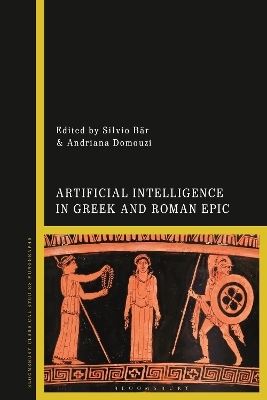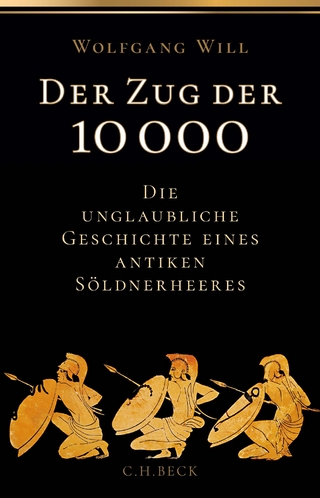
Artificial Intelligence in Greek and Roman Epic
Bloomsbury Academic (Verlag)
978-1-350-26069-6 (ISBN)
Parts one and two consider, respectively, archaic Greek, and Hellenistic and Roman, epics. Contributors explore the representations of Pandora in Hesiod, and Homeric automata such as Hephaestus’ wheeled tripods, the Phaeacian king Alcinous’ golden and silver guard dogs, and even the Trojan Horse. Later examples cover Artificial Intelligence and automation (including Talos) in the Argonautica of Apollonius and Valerius Flaccus, and Pygmalion’s ivory woman in Ovid’s Metamorphoses. Part three underlines how these concepts benefit from analysis of the ekphrasis device, within which they often feature. These chapters investigate the cyborg potential of the epic hero and the literary implications of ancient technology. Moving into contemporary examples, the final chapters consider the reception of ancient literary Artificial Intelligence in contemporary film and literature, such as the Czech science-fiction epic Starvoyage, or Small Cosmic Odyssey by Jan Kr?esadlo (1995) and the British science-fiction novel The Holy Machine by Chris Beckett (2004).
Andriana Domouzi is Postdoctoral Researcher in Classics and Theatre Studies at the National and Kapodistrian University of Athens, Greece. Silvio Bär is Professor of Classics at the University of Oslo, Norway.
List of Illustrations
List of Contributors
1. Introduction: Greek and Roman Authors Imagining Artificial Intelligence: The Case of Epic Poetry, Andriana Domouzi (National and Kapodistrian University of Athens, Greece) and Silvio Bär (University of Oslo, Norway)
I: Archaic Greek Epic
2. Hesiod's Pandora: Animal, Vegetable, Mineral, Lilah Grace Canevaro (University of Edinburgh, UK)
3. The Homeric Trojan Horse: An Intelligent Device, Giulia Maria Chesi (Humboldt-Universität zu Berlin, Germany)
4. Cyber-dogs, 'Gut Thinkings', and the Limits of Recognition in Homer's Odyssey, Brett M. Rogers (University of Puget Sound, USA)
5. Homertron: The Poet-Construct of Il. 2.489–490, Jurgen R. Gatt (Università ta’ Malta, Malta)
6. Hephaestus' Wheeled Tripods, Braitenberg Vehicles and Entangled Being: The Problem of Homer's Technology, Ahuvia Kahane (Trinity College Dublin, Ireland)
II: Hellenistic and Roman Epic
7. Talos: Overcoming the AI Monster?, Genevieve Liveley (University of Bristol, UK)
8. The Tyrants and Their Robots: The Perverted Use of Artificial Intelligence in Apollonius of Rhodes, Alessandro Giardini (Scuola Normale Superiore di Pisa, Italy)
9. Between Nature and Technology: Moschus’ Europa and Ancient Automata, Kat Mawford (University of Manchester, UK)
10. Pygmalion and Pandora in Ovid's Metamorphoses, Alicia Matz (Boston University, USA)
11. Rocking the Boat: Sentient Technology and Metapoetics in Valerius Flaccus' Argonautica, Bev Back (University of Leeds, UK)
III: Conceptualisation and Reception
12. Artifice of Intelligence? Theories of Mind in Ancient Epic, Benjamin Eldon Stevens (Howard University, USA)
13. Heroic Machines: Epic Heroes as Cyborgs, Treasa Bell (Yale University, USA)
14. At the Gates of Mt Olympus: Where AI and Literary Culture Meet, Michiel Meeusen (King’s College London, UK)
15. Hesiod’s Age of Heroes and Technological Evolution in Film, Rocki Wentzel (Augustana University, USA)
16. Homeric Robots and Computers in Love: Artificial Life Forms in Jan Kresadlo’s Ancient Greek Epic Astronautilia (1995), Stefan Weise (Bergische Universität Wuppertal, Germany)
17. A Perfect Woman to Order: The Pygmalion Myth in Chris Beckett's The Holy Machine, Tony Keen (University of Notre Dame London's Global Gateway, UK)
Notes
Bibliography
Index
| Erscheinungsdatum | 29.05.2024 |
|---|---|
| Zusatzinfo | 6 bw illus |
| Verlagsort | London |
| Sprache | englisch |
| Maße | 156 x 234 mm |
| Themenwelt | Literatur ► Klassiker / Moderne Klassiker |
| Geschichte ► Allgemeine Geschichte ► Altertum / Antike | |
| Geisteswissenschaften ► Sprach- / Literaturwissenschaft ► Anglistik / Amerikanistik | |
| Geisteswissenschaften ► Sprach- / Literaturwissenschaft ► Literaturwissenschaft | |
| Informatik ► Theorie / Studium ► Künstliche Intelligenz / Robotik | |
| ISBN-10 | 1-350-26069-X / 135026069X |
| ISBN-13 | 978-1-350-26069-6 / 9781350260696 |
| Zustand | Neuware |
| Haben Sie eine Frage zum Produkt? |
aus dem Bereich


